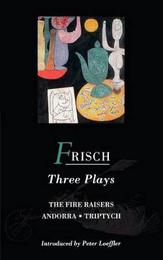
|
Frisch Three Plays: Fire Raisers; Andorra; Triptych
Paperback / softback
Main Details
| Title |
Frisch Three Plays: Fire Raisers; Andorra; Triptych
|
| Authors and Contributors |
By (author) Max Frisch
|
|
Translated by Geoffrey Skelton
|
|
Translated by Michael Bullock
|
| Series | World Classics |
|---|
| Physical Properties |
| Format:Paperback / softback | | Pages:356 | | Dimensions(mm): Height 178,Width 111 |
|
| Category/Genre | Plays, playscripts |
|---|
| ISBN/Barcode |
9780413665607
|
| Classifications | Dewey:833.912 |
|---|
| Audience | | General | | Tertiary Education (US: College) | |
|---|
| Edition |
2nd edition
|
|
Publishing Details |
| Publisher |
Bloomsbury Publishing PLC
|
| Imprint |
Methuen Drama
|
| Publication Date |
6 April 1992 |
| Publication Country |
United Kingdom
|
Description
Three contentious and enduring plays about the clash of the individual and society Fire Raisers (1958) tells the tale of a respectable bourgeois whose house is one day visited by three strangers. It "is successful on every level; the story is as gripping as an adventure story; each line is fraught with several meanings: as an allegory it is unique" (Edna O'Brien); Andorra is based on the author's own experience of anti-semitism in Switzerland and is about Andri, a young man who is believed to be a Jew and who is persecuted by his community as a result; Triptych is a portrait of a writer grappling with his own mortality. The flexible and contemporary translations by Michael Bullock (The Fire Raisers, Andorra) and Geoffrey Skelton (Triptych) are here complemented by an introduction by Peter Loeffler.
Author Biography
Max Frisch (1911-1991) was a playwright and novelist who, together with his Swiss compatriot Durrenmatt, is considered one of the most important postwar playwrights writing in German. Frisch originally studied philology and art at university, before abandoning his studies to become a journalist. After serving in the Swiss army during the Second World War, he took up architecture and pursued this profession until the 1950s, when he became a full-time writer. Frisch had written his first play at the age of 16, but having rejected his early work, it was not until 1944 that he returned to writing plays, with Santa Cruz. His second play, Now They Are Singing Again (1945), took its inspiration from Brecht, dealing as it does with the moral responsibility for war. This Brechtian theme was continued in his next two plays, The Chinese Wall (1946) and When the War Was Over (1949). With the romantic comedy Don Juan, or the Love of Geometry (1953) Frisch offers a new interpretation of the mythical character of the Great Lover. As a result of his increasing disenchantment with what he considered Swiss complacency in the face of mounting totalitarianism and fascism, Frisch wrote two of his most important plays. Biedermann und die Brandstifter (The Fire-raisers, written in 1958 as a radio play), satirizes the moral lethargy of the self-satisfied middle classes. This powerful play was seen in London at the Royal Court Theatre in 1961, and in New York (as The Firebugs) in 1963. It was closely followed by Andorra (1961), his most disturbing and controversial play, in which Frisch exposed and explored antisemitism. Frisch's blending of fantasy with brutal reality owes much to the work of Brecht and Thornton Wilder, both of whom influenced the playwright in his early years. His later plays, like Biography (1968) and Triptych (1979), continue to use the device of the modern morality play as a means of exploring the place of humanity in a difficult world.
|